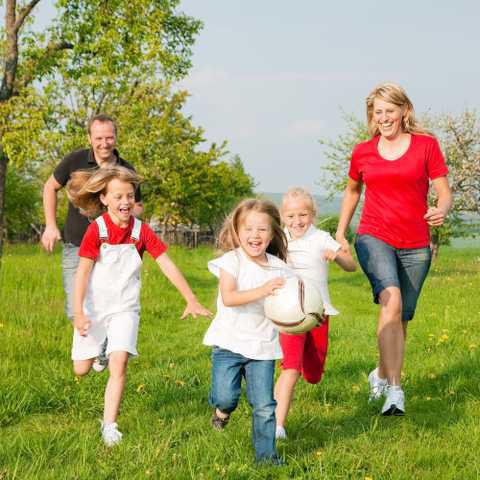Heres another reason to grow your family: Children with younger siblings are less likely to be obese, researchers at the University of Michigan said.
And the difference was significant in the survey of 697 children from birth through age 6, Reuters News Service said.
Children who didnt welcome a baby brother or sister into the family before first grade had almost triple the odds of obesity compared with kids who experienced the birth of a sibling when they were around 3 to 4 years old, Lisa Rapaport wrote for Reuters.
Published in the journal Pediatrics March 11, the study did not offer reasons for the disparity of outcomes, but one of its authors said children may be more physically active when they have siblings with whom they can play.
Maybe families are more likely to take the kids to the park when there is a younger sibling, or maybe the child is less likely to be sedentary, watching TV, when there is a younger sibling to engage them in more active pretend play, Dr. Julie Lumeng, a pediatrics and public-health researcher at the University of Michigan and C.S. Mott Childrens Hospital in Ann Arbor, told Rapaport.
One obesity expert, however, noted that the study did not take into effect other known factors linked to childrens weight, including the parents weight, maternal weight gain during pregnancy, diabetes, breastfeeding and the amount of time the child spends exercising and watching TV.
And the authors note that they did not consider events such as a divorce, move or a parents job loss, which also can affect childrens weight, Reuters said.
But this isn't the first study to offer parents a scientific rationale for having multiple children.
Other studies have shown that kindergartners with siblings have better social skills, that people with siblings are more compassionate, and that brothers and sisters can make each other smarter. There's even some evidence that younger siblings have improved immune systems.
And the difference was significant in the survey of 697 children from birth through age 6, Reuters News Service said.
Children who didnt welcome a baby brother or sister into the family before first grade had almost triple the odds of obesity compared with kids who experienced the birth of a sibling when they were around 3 to 4 years old, Lisa Rapaport wrote for Reuters.
Published in the journal Pediatrics March 11, the study did not offer reasons for the disparity of outcomes, but one of its authors said children may be more physically active when they have siblings with whom they can play.
Maybe families are more likely to take the kids to the park when there is a younger sibling, or maybe the child is less likely to be sedentary, watching TV, when there is a younger sibling to engage them in more active pretend play, Dr. Julie Lumeng, a pediatrics and public-health researcher at the University of Michigan and C.S. Mott Childrens Hospital in Ann Arbor, told Rapaport.
One obesity expert, however, noted that the study did not take into effect other known factors linked to childrens weight, including the parents weight, maternal weight gain during pregnancy, diabetes, breastfeeding and the amount of time the child spends exercising and watching TV.
And the authors note that they did not consider events such as a divorce, move or a parents job loss, which also can affect childrens weight, Reuters said.
But this isn't the first study to offer parents a scientific rationale for having multiple children.
Other studies have shown that kindergartners with siblings have better social skills, that people with siblings are more compassionate, and that brothers and sisters can make each other smarter. There's even some evidence that younger siblings have improved immune systems.





